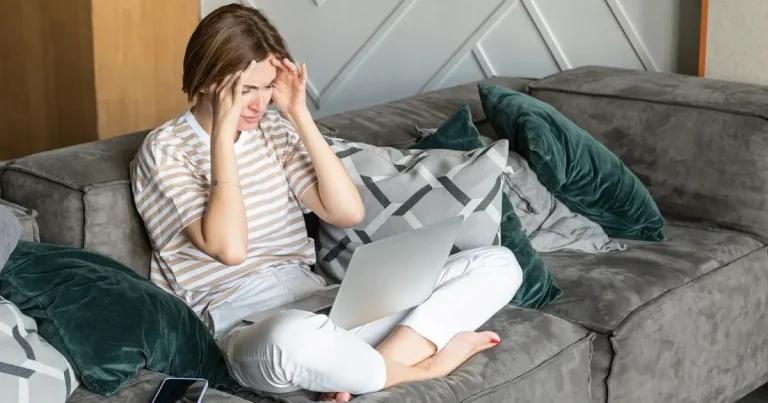

(Current Version)
Tension headaches may feel like pressure or a tight band on your forehead and temples like someone is squeezing the sides of your head together. The discomfort usually lasts 20 minutes to two hours, but it may be present throughout most of the day. Fortunately, there are many things you can do to prevent a tension headache. If over the counter treatments don’t work, healthcare providers may have medications and other therapies to ease tension-type headaches.
📝 What is a tension headache?
Tension headache is a primary headache meaning that it is not caused by other conditions. Tension headaches are the most common type of headache are also known as muscle tension headaches, and stress headaches. Tension headaches occur when neck and scalp muscles become tense or contract. These muscle contractions often cause the head pain. Some people experience tension headaches from time to time. While a tension headache is rarely debilitating, it can certainly make life miserable.
- Pain or pressure felt on both sides of the head, possibly near the temples
- Pain behind the eyes
- Sensitivity to light or noise
- Tension in the neck or shoulders
🤯 Headache triggers
Common causes of tension headaches include:
- Excessive stress
- Neck pain from looking down to read or holding a cell phone between your head and shoulder muscles
- Lack of sleep or sleep problems
- Eye strain
- Excessive caffeine intake. Many people find that food and drink high in caffeine can trigger a tension headache
- Medication-overuse headache. Painkiller overuse for headaches can cause rebound headaches
🤕 How to relieve a tension headache?
A combination of home remedies, lifestyle changes and medication are useful ways to relieve a tension headache.
Massage
Gently massaging the head and neck muscles may provide relief stress and tension by targeting tight, tender muscles in the back of the head, neck and shoulders. Massaging these trigger points may also provide relief from headache pain.
Stress management
Relaxation techniques may reduce or stop headaches such as:
- Deep breathing. Take slow, deep breaths, inhaling from the diaphragm rather than from the chest. Breathe through your nose, gradually filling your lungs with oxygen. Exhale slowly and completely. Too much deep breathing can make you feel light-headed or lead to hyperventilation, so don’t overdo it
- Cognitive-behavioural therapy. Changing negative thought patterns can decrease stress and improve emotions, which can then decrease the frequency and severity of headaches. By looking at different thoughts and behaviours, people can gain valuable insight about their specific tension headache triggers and take steps to better manage and avoid headaches
- Biofeedback. This relaxation technique requires special training, but can help people avoid recurrent tension headaches. Electrodes are attached to the skin to detect electrical signals from your neck and shoulder muscles. This allows you to recognise your signs of becoming tense and practice ways to relax the muscles, before they tighten so much that you develop a tension headache
Regular exercise
Engaging in exercise increases your heart rate, improves circulation, and enhances oxygen delivery to your muscles and tissues. As a result, you’ll experience a natural energy boost, feel more alert, less muscle tension, reduce the production of stress hormones and promote relaxation.
Avoid excessive caffeine
Caffeine may help curb headaches. But heavy daily caffeine use can lead to headaches. Generally, getting more than 400 milligrams of caffeine a day — more than about four cups of coffee — can cause headaches and irritability. Regular caffeine use also increases the risk of headaches. Even quitting caffeine can cause headaches. This may happen whether you quit suddenly or cut back gradually.
Eat regular meals
Headaches can be brought on by hunger and are a signal to remembering to eat regularly. Lack of food or skipping meals can bring on low blood sugar levels and muscle tension due to the body releasing histamine. Perhaps when you’re really busy set an alarm on your phone to remind yourself to eat.
Good quality sleep
Sleep plays a crucial role in our overall health and well-being. It helps us recover from the day’s activities and rejuvenate our bodies. Setting a bedtime routine can be helpful in establishing a regular sleep pattern. This could include activities such as reading or taking a warm bath before bed, which signals to your brain that it is time for rest. By prioritizing regularity and creating habits around bedtime, you may find yourself feeling more rested and mentally refreshed each morning.
Acupuncture
Acupuncture is effective for treating frequent episodic or chronic tension-type headaches. This alternative form of medicine involves inserting very thin needles through the skin in certain points in the body to provide pain relief. It also helps your body release tension and may bring up emotions.
Pain medicine
Over-the-counter pain medicine, such as aspirin, ibuprofen, naproxen, or paracetamol/acetaminophen, may provide headache relief.
Severe headache symptoms may need stronger pain relievers such as antidepressants like amitriptyline. This medicine can cause side effects such as constipation, drowsiness and dry mouth.
📝 Next steps
If you have regular tension headaches, a GP may suggest you keep a headache diary to record details of your headaches to spot triggers. The following information is useful to share with your healthcare provider:
- Day and time the pain began
- Food diary over the past 24 hours
- Number of hours slept and sleep quality
- What you were doing and where you were right before the pain started
- Duration of headaches and what made it stop
If your headache occurs along side a very high temperature, feeling hot and shivery, and having a stiff neck or a rash, it’s important to get urgent care. Get medical help right away if your headache is sudden and severe, or starts after a head injury.
Sources
- What causes headaches? How to treat and prevent migraines
- Tension headaches – NHS
- Managing tension headaches at home: MedlinePlus Medical Encyclopedia
- Tension Headache: What It Is, Causes, Symptoms & Treatment
NowPatient has taken all reasonable steps to ensure that all material is factually accurate, complete, and current. However, the knowledge and experience of a qualified healthcare professional should always be sought after instead of using the information on this page. Before taking any drug, you should always speak to your doctor or another qualified healthcare provider.
The information provided here about medications is subject to change and is not meant to include all uses, precautions, warnings, directions, drug interactions, allergic reactions, or negative effects. The absence of warnings or other information for a particular medication does not imply that the medication or medication combination is appropriate for all patients or for all possible purposes.








